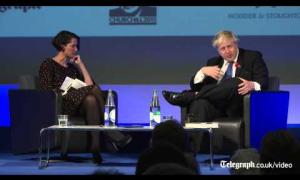Did Drew Westen make a classic speechwriter’s mistake?
August 08, 2011
I opened The New York Times and a speechwriters’ debate broke out.
A lengthy op-ed piece by Emory University psychology professor Drew Westen—an acquaintance, who once keynoted a Speechwriters Conference I put on—accused President Obama of having failed from the outset to make a story of his presidency:
A “simple narrative—and the policies that would naturally have flowed from it—would have inoculated against much of what was to come in the intervening two and a half years of failed government, idled factories and idled hands.”
So was the central argument of Westen, who four years ago published The Political Brain: The Role of Emotion in Deciding the Fate of the Nation.
After comparing Obama unfavorably to the rhetorical firebrand and fireside-chatty Roosevelt, Westen went on to speculate that the reason Obama can’t frame the nation’s task in a compelling narrative is that he can’t make up his mind about what that narrative should be.
Perhaps, he suggests, “we are a nation that is being held hostage not just by an extremist Republican Party but also by a president who either does not know what he believes or is willing to take whatever position he thinks will lead to his re-election. Perhaps those of us who were so enthralled with the magnificent story he told in Dreams From My Father appended a chapter at the end that wasn’t there—the chapter in which he resolves his identity and comes to know who he is and what he believes in.”
Reactions to Westen’s dramatic piece—dramatic because of its scope and its source, an unabashed, frequent Huffington-Posting liberal who quietly served as an actual rhetorical adviser to the Obama campaign (so he told me in the spring of 2008)—came fast and strong.
None stronger than Jonathan Chait’s column at The New Republic.
Chait calls Westen’s piece “a parody of liberal fantasizing.” And closer to our home, Chait says that fantasy has to do with a vast overestimation of the power of rhetoric:
Westen’s op-ed rests upon a model of American politics in which the president in the not only the most important figure, but his most powerful weapon is rhetoric. The argument appears calculated to infuriate anybody with a passing familiarity with the basics of political science. In Westen’s telling, every known impediment to legislative progress—special interest lobbying, the filibuster, macroeconomic conditions, not to mention certain settled beliefs of public opinion—are but tiny stick huts trembling in the face of the atomic bomb of the presidential speech. The impediment to an era of total an uncompromising liberal success is Obama’s failure to properly deploy this awesome weapon.
I’m not sure that’s a liberal fantasy as much as it’s a psychologist’s and rhetorician’s and writer’s predilection.
All areas of expertise that, in fact, President Obama might claim as his own personal strengths.
Which might be the best explanation of all of Obama’s negotiating style which has its strengths and as well as its weaknesses, as I have written elsewhere.
Speechwriters, are we wrong to fixate on rhetoric as President Obama’s problem? And is he wrong to believe so fervently in the power of words to create compromise?
Talk to me. —DM


